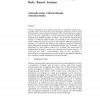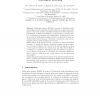19 search results - page 1 / 4 » A computational theory of adaptive behavior based on an evol... |
GECCO
2006
Springer
13 years 8 months ago
2006
Springer
Two mathematical and two computational theories from the field of human and animal learning are combined to produce a more general theory of adaptive behavior. The cornerstone of ...
ATAL
2005
Springer
13 years 10 months ago
2005
Springer
Designing agents whose behavior challenges human players adequately is a key issue in computer games development. This work presents a novel technique, based on reinforcement lear...
COGSR
2010
12 years 12 months ago
2010
Emotion regulation describes how a subject can use certain strategies to affect emotion response levels. Usually, models for emotion regulation assume mechanisms based on feedback...
EPS
1995
Springer
13 years 8 months ago
1995
Springer
PANIC (Parallelism And Neural networks In Classifier systems) is a parallel system to evolve behavioral strategies codified by sets of rules. It integrates several adaptive techni...
LAMAS
2005
Springer
13 years 10 months ago
2005
Springer
Abstract Multi-agent systems (MASs) is an area of distributed artificial intelligence that emphasizes the joint behaviors of agents with some degree of autonomy and the complexiti...


